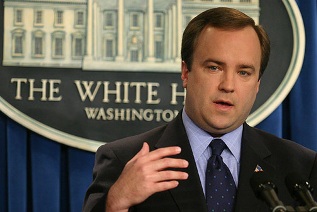There’s a scene in the ’97 noir classic, “L.A. Confidential” that takes place after a front-page story breaks detailing local police beating-up helpless prisoners in the lock-up. After straight-arrow cop Ed Exley unsuccessfully tries to stop the fight, the next day he’s asked if he would be willing to testify against his fellow officers.

“Justice has to be served,” Exley says,“of course I’ll testify.”
When told that most of the men in his department don’t feel that way, Exley says, “That’s because they think silence and integrity are the same thing.”
That line jumped out at me in the whirlwind of reaction to former White House Press Secretary Scott McClellan’s book, “What Happened: Inside the Bush White House and Washington’s Culture of Deception.”
However, amid the claims and counterclaims of who said what, when and why, an important issue seems to have been lost. Like the circumstances involving Colonel Morris Davis (May 29), the McClellan book is another example of Loyalty vs. Honesty; where an individual is labeled disloyal because he or she steps up and tells the truth about events rather than remain “loyal” by being silent.
Loyalty, whether to family, friends, colleagues or organizations is not only an important ethical value but critical in relationships of trust.
In his “Book of Virtues,” Bill Bennett writes that “Our loyalties are important signs of the kinds of persons we have chosen to become. They mark a kind of constancy or steadfastness in our attachments to those other persons, groups, institutions or ideals with which we have deliberately decided to associate ourselves.
“To be a loyal citizen or friend,” Bennett says, “means to operate within a certain framework of caring seriously about the well-being of one’s country or comrade.” However, Bennett adds, “This is very different from being a rubber stamp.”
“The White House would prefer I not speak out openly and honestly about my experiences,” McClellan told Meredith Vieira on the Today Show. The book is “about the slice of history I witnessed during my years in the White House and about the well-intentioned but flawed human beings – myself included – who shaped that history.”
In scenarios involving individuals in political office, the military or enforcement organizations, sometimes people believe that loyalty means absolute fealty to leadership. It doesn’t.
Ethicist Michael Josephson points out that there are limitations to loyalty. “It is not uncommon for friends, employers, co-workers or others who claim loyalty to demand that theirinterests be placed so high that other ethical values are subordinated.
“Loyalty,” Josephson writes, “is a reciprocal concept and one has no right to ask another to sacrifice their ethical principles in the name of a special relationship. Loyalty does not justify violation of… integrity, fairness and honesty.”
“The larger message has been sort of lost in the mix,” McClellan said. “My hope is that by writing this book and sharing openly and honestly what I learned is that in some small way it might help us move beyond the partisan warfare… it’s about looking at the permanent campaign culture in Washington, D.C., and how we can move beyond it.”
Near the end of his interview McClellan was asked if he was being disloyal.
“I felt a higher loyalty, a loyalty to the truth.”
Comments









